|
|
|
Sort Order |
|
|
|
Items / Page
|
|
|
|
|
|
|
| Srl | Item |
| 1 |
ID:
105871
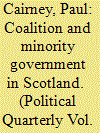

|
|
|
|
|
| Publication |
2011.
|
| Summary/Abstract |
The United Kingdom general election result in 2010 produced a hung or balanced parliament for the first time in over three decades. Since the United Kingdom has limited postwar experience of this outcome, it is natural that commentators have begun to look elsewhere for lessons on the practicalities of minority and coalition government. This article considers the lessons we can learn from the Scottish parliamentary experience since 1999. It outlines two main points of comparison: strength and stability. One might assume that coalition provides more of both than minority government. Indeed, for that reason, it is rare for central or devolved governments in the United Kingdom to operate as minorities through choice. Yet, the Scottish experience shows that the differences between coalition and minority government are not completely straightforward. Much depends on the institutional context and, in many cases, idiosyncratic elements of particular systems. Consequently, one can identify a trade-off in comparative analysis: as the identification of elements specific to one system increases, the ability to draw clear meaningful lessons decreases.
|
|
|
|
|
|
|
|
|
|
|
|
|
|
|
|
| 2 |
ID:
096259


|
|
|
|
|
| Publication |
2010.
|
| Summary/Abstract |
The return of a hung parliament at the 2010 general election is a serious possibility. But due to Westminster's limited recent experience of parliaments under 'no overall control' there is little institutional memory in Whitehall or Westminster, and even less public understanding, of what the implications would be. This article sets out to analyse the principal challenges that would be faced by government, opposition, parliament and the media in the event of a hung parliament. Drawing on experience from Canada, New Zealand and Scotland, we discuss the difficulties that may arise during the immediate government formation process and in the course of making minority or multiparty governance work on an ongoing basis. We conclude that a hung parliament need not undermine political stability or effective governance, but that all actors would need to adapt their behaviour and should therefore prepare carefully for this eventuality.
|
|
|
|
|
|
|
|
|
|
|
|
|
|
|
|
| 3 |
ID:
155410
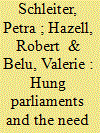

|
|
|
|
|
| Summary/Abstract |
The general elections of 2017 and 2010 produced hung parliaments in which no single party could command an overall majority; in May 2015 the UK only narrowly avoided that outcome. When a parliament is hung, more than one potential government can be viable, and the constitutional rules that determine who has the first right to form the government can thus have a decisive influence on which government forms. In the past, the UK has applied several potentially contradictory rules (based on conventions and principles), which do not all follow an equally democratic logic. This status quo is problematic because it can generate political controversy and uncertainty, in addition to jeopardising the Monarch's role in the government formation process. A reform that enables parliament to elect the leader who will be tasked with the formation of the next government would resolve these problems and provide constitutional clarity.
|
|
|
|
|
|
|
|
|
|
|
|
|
|
|
|
| 4 |
ID:
107320
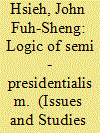

|
|
|
|
|
| Publication |
2011.
|
| Summary/Abstract |
Semi-presidentialism is a vague term which may refer to several different forms of government. This paper explores only one special type of semi-presidentialism, and shows that, even under similar institutional arrangements, actual practices may differ greatly. The two cases, France and Taiwan, share the basic features of such a system, though the French president has more powers than his counterpart in Taiwan. But interestingly, when the presidents party/coalition has been in the minority in parliament, the French president has frequently chosen to compromise and to cohabit ate with a prime minister supported by the parliamentary majority, while his counterpart in Taiwan has decided to confront the parliament by forming a minority government. As argued in the paper this can be accounted for by strategic behavior on the part of the president and the parliamentary majority in manipulating the loophole created by such a system. History and the nature of social cleavages have something to do with it as well.
|
|
|
|
|
|
|
|
|
|
|
|
|
|
|
|
| 5 |
ID:
178194
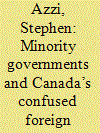

|
|
|
|
|
| Summary/Abstract |
Three case studies demonstrate that federal limits on foreign investment in Canada have been motivated by political not economic considerations. The cases—the abortive 1963 tax on foreign takeovers, the 1973–1974 creation of the Foreign Investment Review Agency, and the 2008 and 2010 decisions to block the purchase of two Canadian companies—shared many features. All three involved minority governments that were vulnerable to shifts in public opinion. All three governments were skeptical about turning away foreign capital. Yet all three undertook measures to limit investment. All three then abandoned the policy as soon as political circumstances changed. This decision-making process helps explain why Canadian foreign investment policy has often been confused and inconsistent.
|
|
|
|
|
|
|
|
|
|
|
|
|
|
|
|
| 6 |
ID:
099783
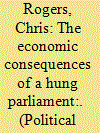

|
|
|
|
|
| Summary/Abstract |
The British general election on 10 May 2010 delivered Britain's first hung Parliament since February 1974, and in the run-up, the Conservative party made much of the economic difficulties Britain faced in the second half of the 1970s in order to try and convince voters that anything other than a Tory vote would risk exposing the nation to the discipline of financial markets. The question of how well equipped an exceptional kind of British government is to deal with exceptional economic circumstances is therefore of paramount importance. This paper argues that the Conservative party made too much of the impact of the 1974 hung Parliament in precipitating subsequent economic crisis and suggests that as such, there is no reason to assume that the Conservative-Liberal coalition government is ill-equipped to manage British economic affairs in difficult circumstances.
|
|
|
|
|
|
|
|
|
|
|
|
|
|
|
|
| 7 |
ID:
138281


|
|
|
|
|
| Summary/Abstract |
The chances of Labour winning the 2015 general election with a comfortable overall majority are vanishingly small. It could, however, emerge as the largest party or finish just a handful of seats behind the Conservatives. Either scenario would give it at least a chance—and a bigger chance than many realise, we argue—of forming a government. In that event, Labour may be faced with a choice between getting together with another party (or parties) to form a majority coalition or else forming a minority government (either on its own or with one or more partners), which could assemble different majorities for different pieces of legislation or try to negotiate a ‘confidence and supply’ agreement. Given the precedents from the UK and overseas, we argue that, faced with this dilemma, Labour should do all it can to form a majority coalition. We also argue that Labour can learn some useful lessons from the Cameron–Clegg coalition.
|
|
|
|
|
|
|
|
|
|
|
|
|
|
|
|
|
|
|
|
|